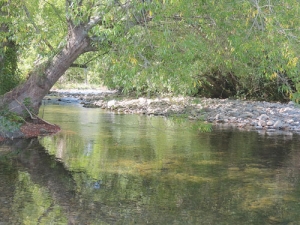MPI Hails Kiwifruit Boom as Horticulture Revenue Surges Past $9 Billion
Ministry for Primary Industries (MPI) Director General Ray Smith is giving a big shout-out to the horticulture sector, especially kiwifruit.
 NZ needs to be very careful about not allowing the debate over fresh water quality to be solely about the dairy industry.
NZ needs to be very careful about not allowing the debate over fresh water quality to be solely about the dairy industry.
The country needs to be very careful about not allowing the debate over fresh water quality to be solely about the dairy industry.
That's the view of Environment Minister Dr Nick Smith who, along with Primary Industry Minister Nathan Guy, recently released a consultation document on fresh water entitled 'Next Steps'. This sets out a series of initiatives to improve water quality in lakes, rivers and waterways.
One of the main proposals centres on having dairy cows and pigs excluded from waterways by next July and beef and deer being phased in by 2030. A fine of $100 per animal up to a maximum of $2000 is also proposed.
Smith told Rural News that improving water quality is not just an issue for rural NZ, but for urban NZ as well.
"We need to be honest with city folk and tell them that their water ways are the most polluted. Having said that, we need farmers to appreciate that our biggest water quality problem by scale is in those areas where there is intensive farming," he adds.
"The Government wants to see that everybody does their share of the heavy lifting. There is no question that dairy farmers are under substantial financial pressure and the Government does need to take that into account.
"With that in mind, our view is that the direction around water quality needs to be constant, but the pace needs to be adjusted to take account of the level of financial pressure the dairy industry is under at the moment."
Smith says, in actual fact, the requirement to fence cows out of water ways is not a major one for the dairy industry. He says about 98% of dairy farmers already comply and there are just a few stragglers that need to be dealt with.
Pāmu has welcomed ten new apprentices into its 2026 intake, marking the second year of a scheme designed to equip the next generation of farmers with the skills, knowledge, and experience needed for a thriving career in agriculture.
One team with 43 head, including a contingent from Mid Canterbury, are reflecting on a stellar NZ DairyEvent.
Fonterra farmer shareholders have approved the mechanism for a $2/share capital return expected from the sale of its global consumer and associated businesses.
Trainees in the horticulture industry studying towards a certificate or diploma can now apply for Horticulture New Zealand's (HortNZ) 2026 Industry Training Scholarships programme.
OPINION: The first three Global Dairy Trade (GDT) auctions have been a morale booster for farmers.
Former Fonterra executive Alex Turnbull has been appointed CEO to lead all five Yili Oceania Business Division companies in New Zealand.